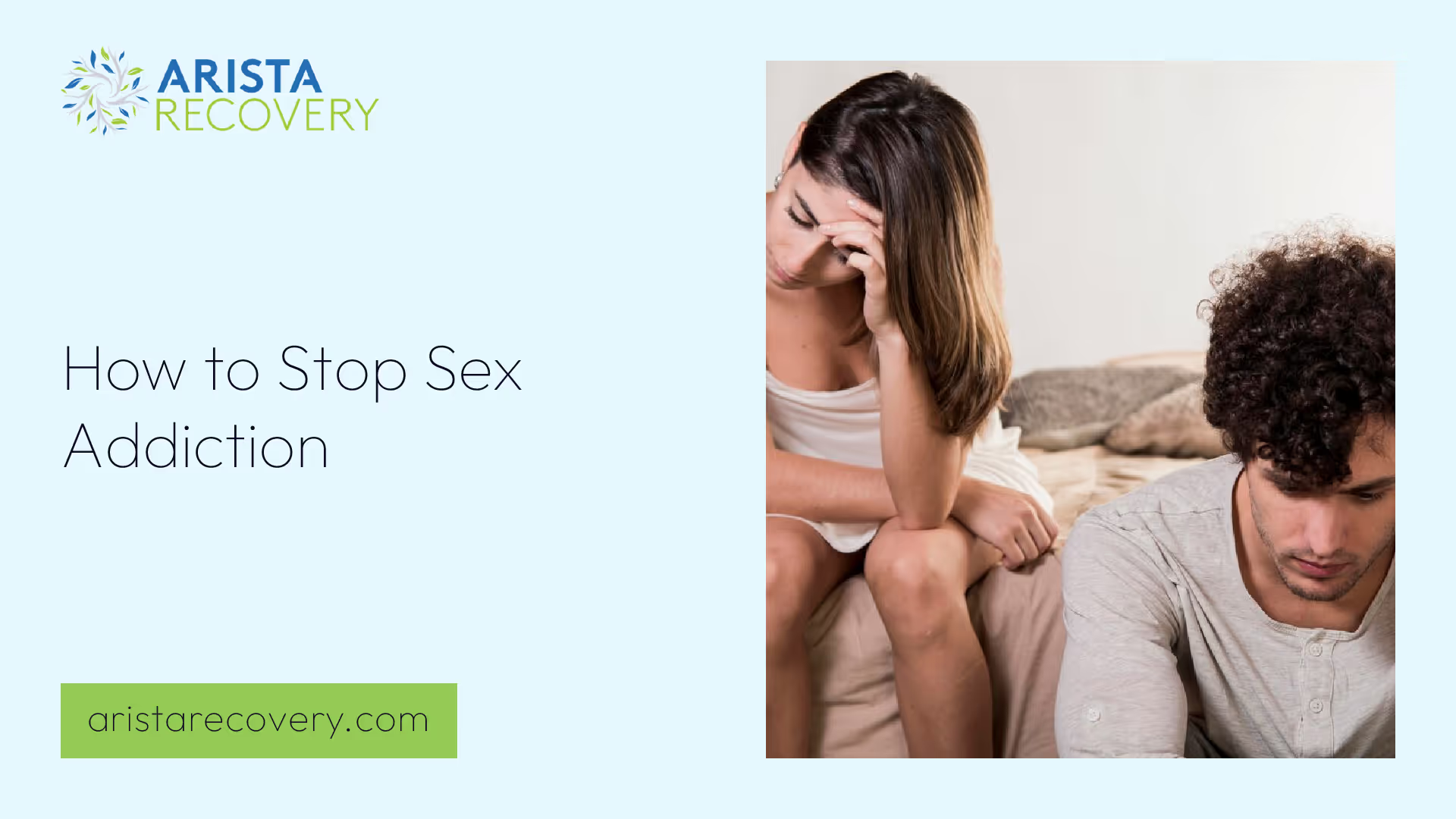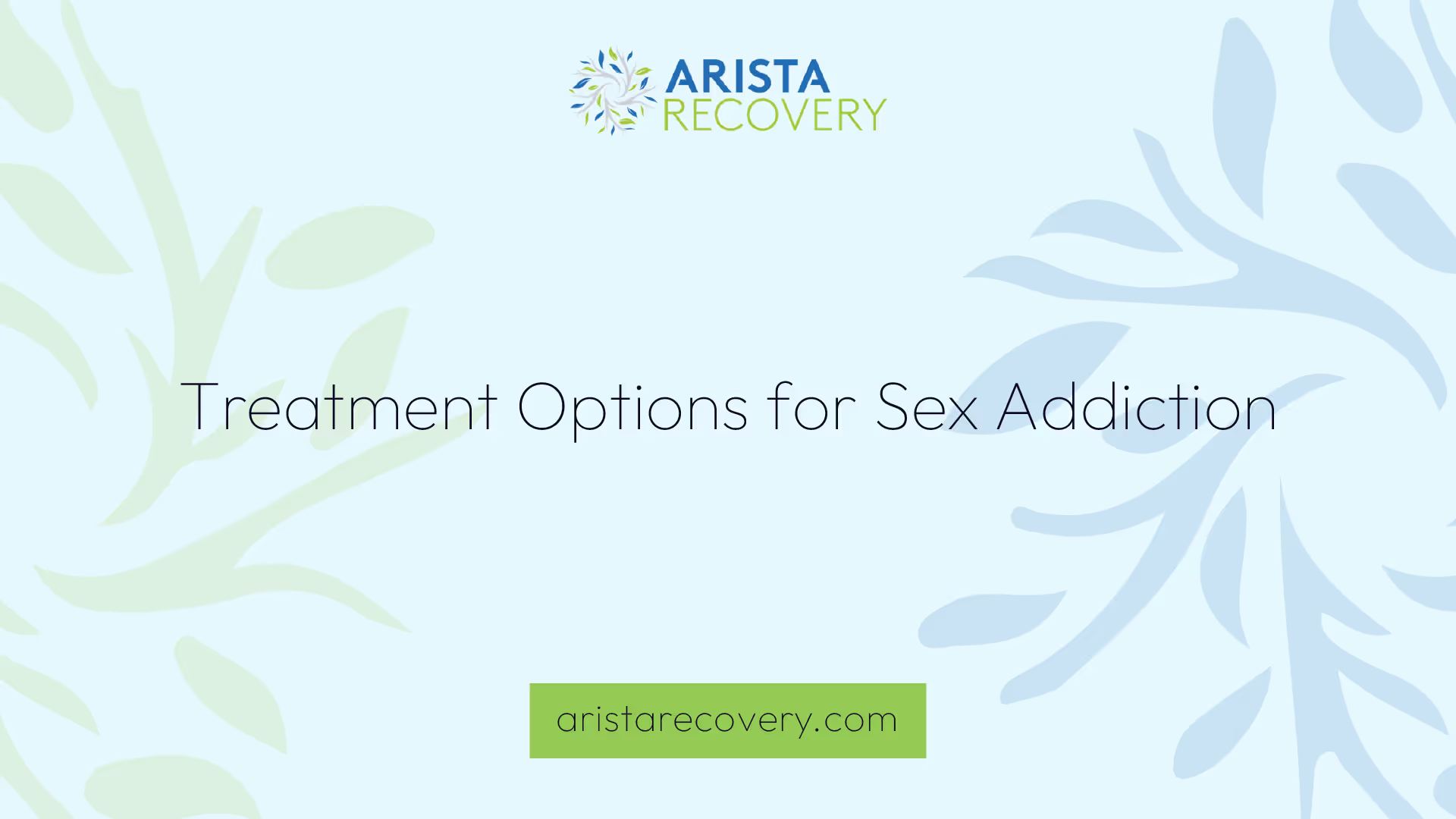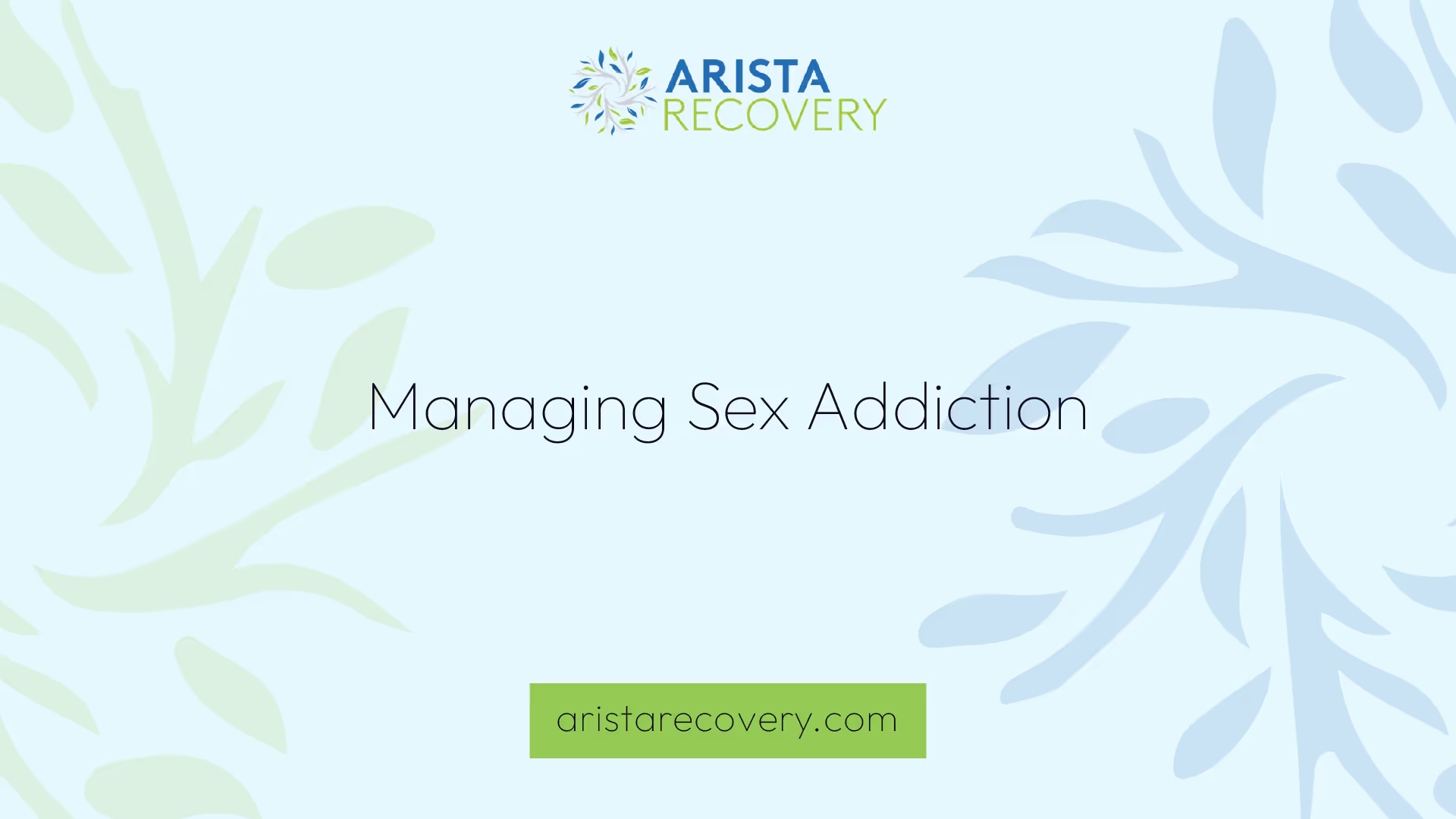How to Stop Sex Addiction


Understanding Sex Addiction
To effectively address and stop sex addiction, it's essential to first understand its underlying causes and risk factors.
Causes of Sex Addiction
Sex addiction can arise from a variety of factors that impact an individual's mental and emotional well-being. Some of these causes include:
- Changes in Brain Chemistry: Engaging in compulsive sexual behaviors can alter brain chemistry, creating a cycle of dependency. (Addiction Help)
- Unhealthy Stress Coping Mechanisms: Individuals may turn to sexual activities as a way to cope with stress, anxiety, or depression.
- History of Trauma: A history of trauma, particularly sexual trauma, can significantly contribute to the development of sex addiction. (American Addiction Centers)
- Psychological Factors: The drive for sexual fulfillment often stems from an unmet psychological need to relieve psychological tension rather than a desire for closeness or relationships. (American Addiction Centers)
Family History and Risk
Family history plays a significant role in the risk of developing sex addiction. Individuals with a family history of addiction are more likely to develop sex addiction themselves. This increased risk can be attributed to both genetic and environmental factors.
- Genetic Predisposition: Genetic factors can make some individuals more susceptible to addictive behaviors, including sex addiction. (Addiction Help)
- Environmental Influences: Growing up in an environment where addiction is present can normalize such behaviors, increasing the likelihood of developing similar issues.
Recognizing these causes and risk factors is the first step in addressing sex addiction. By understanding the root causes, individuals and families can seek appropriate treatment options and develop effective coping strategies. For more information on managing addiction, see our articles on how to stop caffeine addiction and how to stop social media addiction.

Treatment Options for Sex Addiction
Therapy for Sex Addiction
Therapy is the most common and effective treatment for sex addiction. Cognitive Behavioral Therapy (CBT) is frequently used to help individuals identify and change thought patterns and false beliefs that lead to addictive behaviors [1]. CBT helps addicts recognize triggers and develop coping strategies to manage their urges.
A psychologist, psychiatrist, or sex therapist can provide therapy. They work with patients to address underlying issues contributing to the addiction, such as trauma, anxiety, or mood disorders. The goal is to help individuals gain control over their behaviors and develop healthier relationships with sex.
Table: Types of Therapy for Sex Addiction
Medication and Support Groups
While there is no specific medication approved to treat sex addiction, certain medications can help manage related symptoms. Medications acting on the brain's "urge and behavior" hormones and chemicals, such as those used for anxiety or mood disorders, may be prescribed.
Support groups are a valuable resource for individuals struggling with sex addiction. These groups provide a safe space to share experiences, receive support, and build accountability. Many support groups are modeled after the 12-step program of Alcoholics Anonymous. Examples include Sex Addicts Anonymous (SAA) and Sexaholics Anonymous (SA).
Table: Medication and Support Groups for Sex Addiction
Combining therapy, medication, and support groups can provide a comprehensive approach to treating sex addiction. For more information on managing addiction, visit our articles on how to stop caffeine addiction, how to stop social media addiction, and how to stop eating addiction.

Managing Sex Addiction
Effectively managing sex addiction requires a combination of coping strategies and professional assistance. Below we explore these in detail.
Coping Strategies
Individuals struggling with sex addiction can utilize several coping strategies to manage their urges and behaviors effectively. These strategies can help them maintain control and reduce the negative impact on their lives.
- Self-awareness: Recognizing triggers and understanding the situations or emotions that lead to compulsive sexual behavior is a key step. Keeping a journal to track these patterns can be helpful.
- Healthy Distractions: Engaging in alternative activities like exercise, hobbies, or spending time with friends and family can divert attention away from sexual urges.
- Mindfulness and Relaxation Techniques: Practices such as meditation, deep breathing exercises, and yoga can help manage stress and reduce compulsive behaviors.
- Setting Boundaries: Establishing clear boundaries in relationships and online interactions can prevent situations that may lead to problematic behavior.
- Support Networks: Joining support groups where individuals can share their experiences and coping mechanisms can offer emotional support and accountability. Groups like S-Anon provide valuable resources for both addicts and their families.
Seeking Professional Help
Professional help is crucial for effectively managing sex addiction. Treatment often involves a multidisciplinary approach, including therapy, medication, and support groups.
- Therapy: Psychological therapy, whether it's cognitive-behavioral therapy (CBT), psychodynamic therapy, or sex therapy, is fundamental in addressing the underlying causes and managing the symptoms of sex addiction [2]. Therapy can help individuals explore the root causes of their behavior, develop healthier coping mechanisms, and work towards long-term recovery. For more details on therapy options, visit our section on therapy and counselors.
- Medication: In some cases, medications may be prescribed, especially if there are co-occurring conditions such as anxiety or mood disorders. These medications can help manage symptoms and reduce compulsive urges.
- Support Groups: Support groups like S-Anon offer a safe space for individuals to share their experiences and gain insights from others facing similar challenges. These groups also provide tools for recovery and emotional support.
- Comprehensive Treatment Plans: Working with a healthcare professional to develop a personalized treatment plan that includes therapy, medication, and lifestyle changes can lead to more effective management of sex addiction. Honesty and openness with oneself, family, and partners are essential components of successful treatment.
For more information on managing other types of addictions, you can explore our articles on how to stop caffeine addiction, how to stop social media addiction, and how to stop eating addiction.
Managing sex addiction is a lifelong commitment, similar to managing other types of addictions. Utilizing coping strategies and seeking professional help can lead to a healthier and more fulfilling life.
Support for Individuals Affected
S-Anon for Family Members
S-Anon provides essential support to people living with or who have lived with the experience of a loved one's sex addiction. This fellowship offers a safe space for friends, partners, family members, parents, and spouses of sex addicts to share their experiences, strength, and hope as they navigate the path to recovery [4].
S-Anon meetings are a cornerstone of this support system, providing a structured environment where individuals can connect with others facing similar challenges. These meetings promote a sense of community and understanding, which can be incredibly beneficial for those feeling isolated or overwhelmed by their loved one's addiction.
S-Anon Tools for Recovery
S-Anon offers a variety of tools designed to aid in the recovery process. These include S-Anon meetings, S-Anon literature, the S-Anon 12 Steps, and the practice of passing recovery along to others. These resources have helped thousands of individuals lead healthier lives despite their loved one's sex addiction [4].
- S-Anon Meetings: These regular gatherings provide a supportive environment where members can share their stories and offer mutual support.
- S-Anon Literature: Books and pamphlets that offer insights, guidance, and practical advice for coping with the effects of sex addiction on families.
- S-Anon 12 Steps: A structured recovery program that helps individuals focus on their own healing and personal growth.
- Passing Recovery Along: Encouraging members to share their experiences and support new members in their journey towards recovery.
For more information on dealing with other forms of addiction, you can explore our articles on how to stop caffeine addiction, how to stop social media addiction, and how to stop video game addiction.
Recognizing Sex Addiction
Identifying sex addiction can be challenging, but recognizing the signs and behaviors is a crucial first step towards seeking help. This section delves into the symptoms of sex addiction and how to differentiate it from a high sex drive.
Symptoms and Behaviors
Sex addiction manifests in various ways and can significantly impact an individual's life. Here are some common symptoms and behaviors:
- Obsessive Sexual Thoughts: Persistent, intrusive thoughts about sex.
- Excessive Time Spent on Sexual Activities: Spending an inordinate amount of time engaging in or seeking out sexual activities.
- Shame or Depression: Feelings of guilt, shame, or depression related to sexual behavior.
- Preoccupation with Sex: Constantly thinking about sex, even when it interferes with daily life.
- Excessive Masturbation: Engaging in masturbation to the point that it affects normal functioning.
- Risky or Inappropriate Sexual Behaviors: Engaging in behaviors that are risky or socially inappropriate.
- Cheating on Partners: Infidelity or cheating on partners repeatedly.
- Engaging in Criminal Offenses: In extreme cases, engaging in criminal activities such as stalking, rape, or child molestation.
These symptoms align with the classic definition of addiction: "a chronic and escalating behavior that the person is helpless to stop even when it causes harmful consequences" [5]. For more on managing addiction, you might find our articles on how to stop caffeine addiction and how to stop eating addiction helpful.
Differentiating from High Sex Drive
It is essential to distinguish between a high sex drive and sex addiction. Individuals with a high sex drive can still control their urges and lead a normal life. In contrast, those with sex addiction often feel out of control when it comes to sex, leading to distress and problems in relationships [2].
Understanding these differences is crucial for individuals and families affected by sex addiction. Recognizing the signs can help in seeking appropriate treatment and support. For additional resources on managing addiction, consider exploring our guides on how to stop social media addiction and how to stop video game addiction.
Overcoming Sex Addiction
Sex addiction, also known as hypersexuality, can be a challenging condition to manage. However, with the right support and treatment, individuals can work towards overcoming their addiction and returning to a healthy sexual lifestyle.
Therapy and Counselors
Therapy is a cornerstone in the treatment of sex addiction. Cognitive Behavioral Therapy (CBT) is often the most common and effective form of treatment. CBT helps individuals identify and modify the thought patterns and false beliefs that lead to addictive behaviors [1]. Through CBT, individuals can learn new coping strategies and ways to manage their urges.
Individuals affected by sex addiction often benefit from working with a psychologist, psychiatrist, or sex therapist. These professionals can provide personalized treatment plans and prescribe medications if co-occurring disorders such as anxiety or depression are present [2].
For those seeking faith-based support, organizations like Christian Counseling Associates offer trained sex counselors who can assist individuals in working through their addiction. These counselors provide a supportive environment to address the addiction from both a psychological and spiritual perspective.
Returning to Healthy Sexuality
Returning to a healthy sexual lifestyle is a key goal for individuals overcoming sex addiction. This process involves more than just managing urges; it requires a holistic approach to improve overall well-being.
Medications can play a role in treating hypersexuality. These may include antidepressants or other medications prescribed for co-occurring medical conditions [3]. However, medication should be combined with therapy and support groups for the best outcomes.
Support groups, modeled after the 12-step program of Alcoholics Anonymous, provide a community of individuals facing similar challenges. These groups offer a safe space to share experiences and strategies for managing addiction. For families affected by sex addiction, organizations like S-Anon provide resources and support.
It's important to recognize that there isn't a cure for sex addiction, but it can be effectively managed with a lifelong commitment. Being honest and open with oneself and others, including family and partners, is crucial for effective management [3].
For more information on how to manage and overcome various addictions, you can explore our articles on how to stop caffeine addiction, how to stop social media addiction, and how to stop video game addiction.
References
[1]: https://www.addictionhelp.com/sex-addiction/causes/
[2]: https://www.webmd.com/mental-health/addiction/signs-sex-addict
[3]: https://my.clevelandclinic.org/health/diseases/22690-sex-addiction-hypersexuality-and-compulsive-sexual-behavior
[4]: https://sanon.org/
[5]: https://www.counselgodsword.com/single-post/healthy-sex-drive-or-sex-addiction
[6]: https://sanon.org
You’re not alone in this.
When mental health challenges and addiction intersect, it can feel isolating. At Arista, we offer compassionate, evidence-based, and trauma-informed care to help you heal, grow, and move forward.
You’re not alone in this.
When mental health challenges and addiction intersect, it can feel isolating. At Arista, we offer compassionate, evidence-based, and trauma-informed care to help you heal, grow, and move forward.
Support that moves with you.
You’ve taken a brave first step. At Arista Recovery, we’re here to help you continue with best-in-class care designed for long-term healing and support.
.webp)






